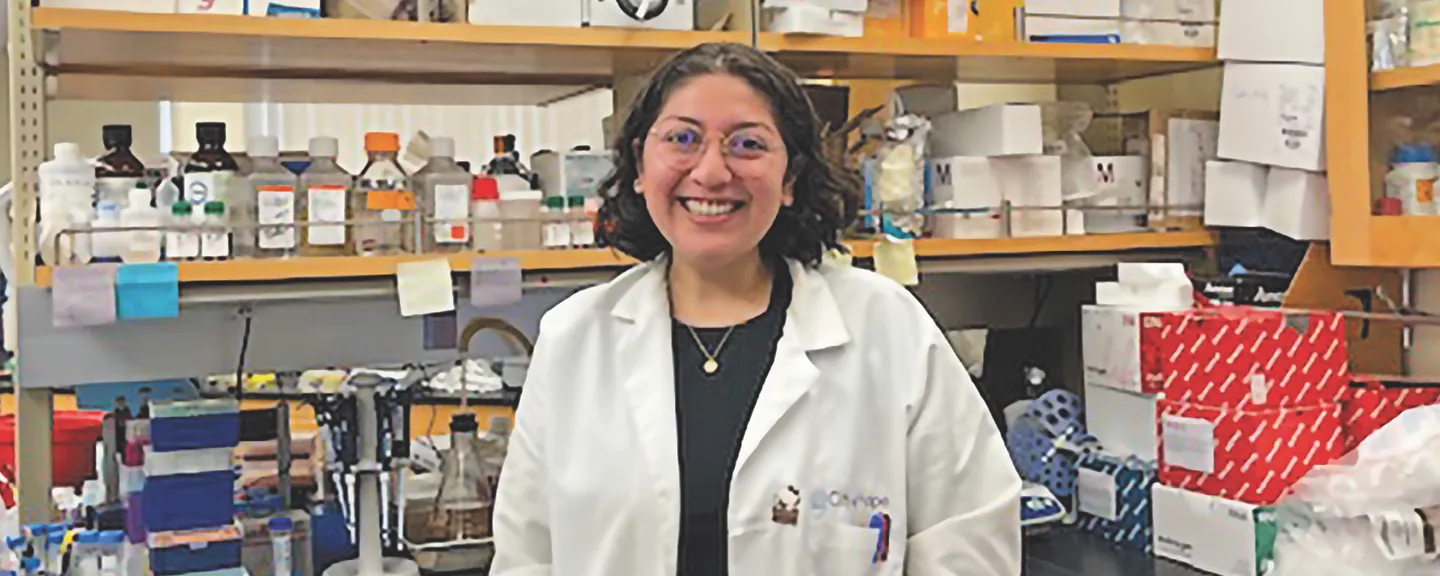- Home
- >
- APU Articles
- >
- News Article
Undergraduate Research: Training the Next Generation of Scientists
August 22, 2022 | Written By Megan Prosser

“When I started my position at City of Hope, the lab practices I had learned at APU allowed me to thrive in a fast-paced environment where it is easy to be overwhelmed with many experiments happening simultaneously,” she said. “Documenting experiments and using online scholarly resources has allowed me to gain a better understanding of an experiment’s significance with the overarching project goal in mind. Ultimately, my APU education encouraged my curiosity, which is the driving force behind my research. It continues to motivate me in the lab today.”
Valencia’s research journey began early in her undergraduate career–as a sophomore. The Department of Biology and Chemistry emphasizes the importance of experiential learning through the Student to Scholar program, where students have the opportunity to engage in faculty-student research partnerships throughout the academic year and over the summer. This unique experience enables students to direct the development of a research project under the mentorship of a faculty member. Projects include areas such as regenerative medicine, pharmacology, global change, and cancer biology, among many others.
“The sky’s the limit in terms of research projects,” said Richart. “I help students get started, but they have freedom in how the experiment is designed and how they’ll test their hypotheses.” At many universities, this is an opportunity typically afforded only to graduate and doctoral students, but at APU it is built into the fabric of undergraduate scientific training.
Richart’s research focuses on the analysis of a fungus, Aspergillus sclerotiorum, that is pathogenic to termites, meaning the discovery of a natural pesticide. Valencia studied the effect of that fungus on cell-cycle arrest in fruit flies, and a compound secreted by the fungus that may inhibit cell division, leading to an understanding of the mechanism of pathogenicity.
A hands-on research mentor, Richart supports student growth and development in conceptual understanding and technical execution. She is often in the laboratory guiding her students to develop skills in designing and executing experiments, data analysis, appropriate record keeping, and scientific communication. Ultimately, Richart mentors students to become independent researchers.
“Throughout my undergraduate research experience, Dr. Richart encouraged me to ask many questions and be resourceful,” Valencia said.
In addition to guiding scientific development, Richart also models work-life balance for her research students, and Valencia noted that this modeling has continued to equip her to combat burnout in her current career.
Another key component of Richart’s mentorship is faith integration. “She encouraged me to attend seminars hosted by APU and taught me how faith is intrinsically connected to our call to be good stewards of the environment,” Valencia said. “Her advocacy for using science to better understand and care for the environment is a perfect demonstration of how she uses her career and her faith to prompt change. It is a lesson that I hope to achieve in my career.”
In her APU research, Valencia learned a variety of experimental techniques, including cell culture, flow cytometry, western blot, and proliferation assays, and was encouraged to pursue opportunities to present and fund her work. In 2020, she was awarded first place for best poster presentation in the cellular/molecular category at the Beta Beta Beta National Biological Honor Society district convention, and was awarded a competitive undergraduate research fellowship from the American Society for Microbiology to continue her research progress. These types of research experiences are a hallmark of the APU experience in biology and chemistry and prepare APU students to be highly competitive in gaining admittance to graduate programs and careers in research.
In Valencia’s case, this exposure sparked a love of science that will last a lifetime. She plans to complete a PhD in Virology, aspiring to continue in the research profession, and she desires to work alongside and mentor others as they delve into the unknowns of science, creating new knowledge. She recognizes the invaluable influence that Richart’s mentorship played in her development as a researcher and plans to pay it forward as she trains the next generation of scientists.